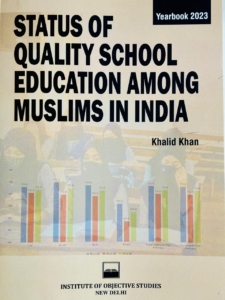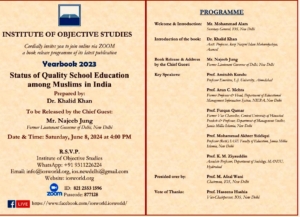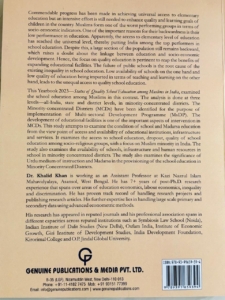
Status of Quality School Education among Muslims in India: Year Book 2023 by Khalid Khan, Institute of Objective Studies
Status of Quality School Education among Muslims in India: Year Book 2023 by Khalid Khan, Institute of Objective Studies (2024), Pages 156, Price Rs. 500/-, Genuine Publications & Media Private Limited, Delhi
REVIEW by Prof. Arun C Mehta
The Status of Quality School Education among Muslims in India: Year Book 2023 by Khalid Khan, Institute of Objective Studies (2024), provides a comprehensive analysis of the current state of school education among Muslims in India. The book is primarily based on the 75th Round of the NSS survey on Education: 2017-18, data generated through the District Information System for Education (DISE), and the Census of India 2011.
- The Year Book 2023 is divided into Nine Chapters, covering various aspects of Muslim education in India. Chapter 1 outlines the need for the study, research questions, objectives, methodology, and data sources.
- Chapter 2 discusses the public policy on school education, including the Sachar Committee and the Prime Minister’s 15-point program for the welfare of the Muslim minorities.
- Chapter 3 examines religion-wise disparities in education at the all-India level, including access to school education and factors affecting access at elementary, secondary, and higher secondary levels.
- Chapter 4 analyses religion-wise disparities in education at the state level gender-wise.
- Chapter 5 presents the status of dropouts among religious groups by income groups, occupational background, and at the state level.
- Chapter 6 discusses the availability of educational facilities in Minority Concentrated Districts (MCDs), exclusively based on UDISE data on different types of facilities in schools.
- Chapters 7 and 8 focus on regional disparities in the availability of teachers and infrastructure in schools at the state and district levels.

Status of Quality School Education among Muslims in India: Year Book 2023 by Khalid Khan, Institute of Objective Studies (Release program)
The book highlights several challenges faced by Muslim students in India, including lack of access to quality education, poverty, and social and cultural norms that discourage girls from pursuing education. It also emphasizes the need for rigorous efforts to address the challenges faced by Muslim students.
The author must be commended for their rigorous efforts to collate the data and undertake a thorough analysis. However, the book has some limitations.
- The 75th NSS data of 2017-18 is outdated and does not present information below the state level, i.e., district level.
- The author could not fully explore the available data and compute the average annual dropout rate at the state level or in MCDs based on the UDISE data.
- To improve the analysis, the author should have computed grade-to-grade flow rates (promotion, repetition, and dropout rates), transition rates from one level to another, and retention rates at Grades V, VIII, X, and XII for Muslim children. Similarly, the Gross Enrolment Ratio in the case of Muslim children should have been computed and analysed based on the UDISE data.
- It is better to switch the focus of the analysis from MCDs to the education of Muslims, which is entirely possible to undertake from the UDISE data at the primary, upper primary, secondary, & higher secondary levels of education at the state, district and lower levels..
- Based on the UDISE data, different indicators in the case of the education of Muslims shall be presented over time from 2018-19 to 2021-22 at block, district, state, and all India levels. Not only indicators be presented, but absolute numbers, at the state, and all India levels must be attempted.
- If possible, the publication’s scope should have extended to higher education. All India Survey on Higher Education data must be explored to present the status of Muslim education and enable complete analysis, including both school and higher education in India.
- The author should also have presented different data sources on education of Muslims and critically analyzed different sources. Additionally, the author should have critically examined the present status of data sets on the education of Muslims vis-à-vis recommendations of the Sachar Committee (2006).
To sum up, the book provides valuable insights into the current state of school education among Muslims in India and highlights the need for more efforts to address the disparities & challenges faced by Muslim students in India, for which Dr. Khalid Khan must be congratulated.




